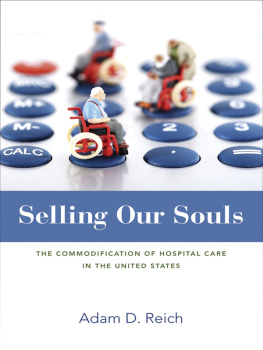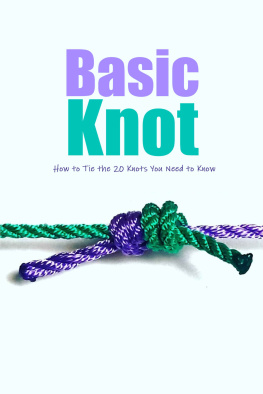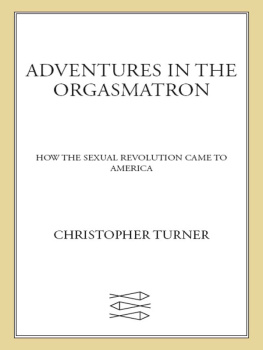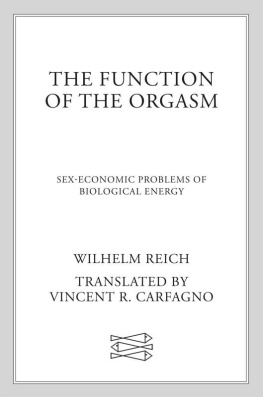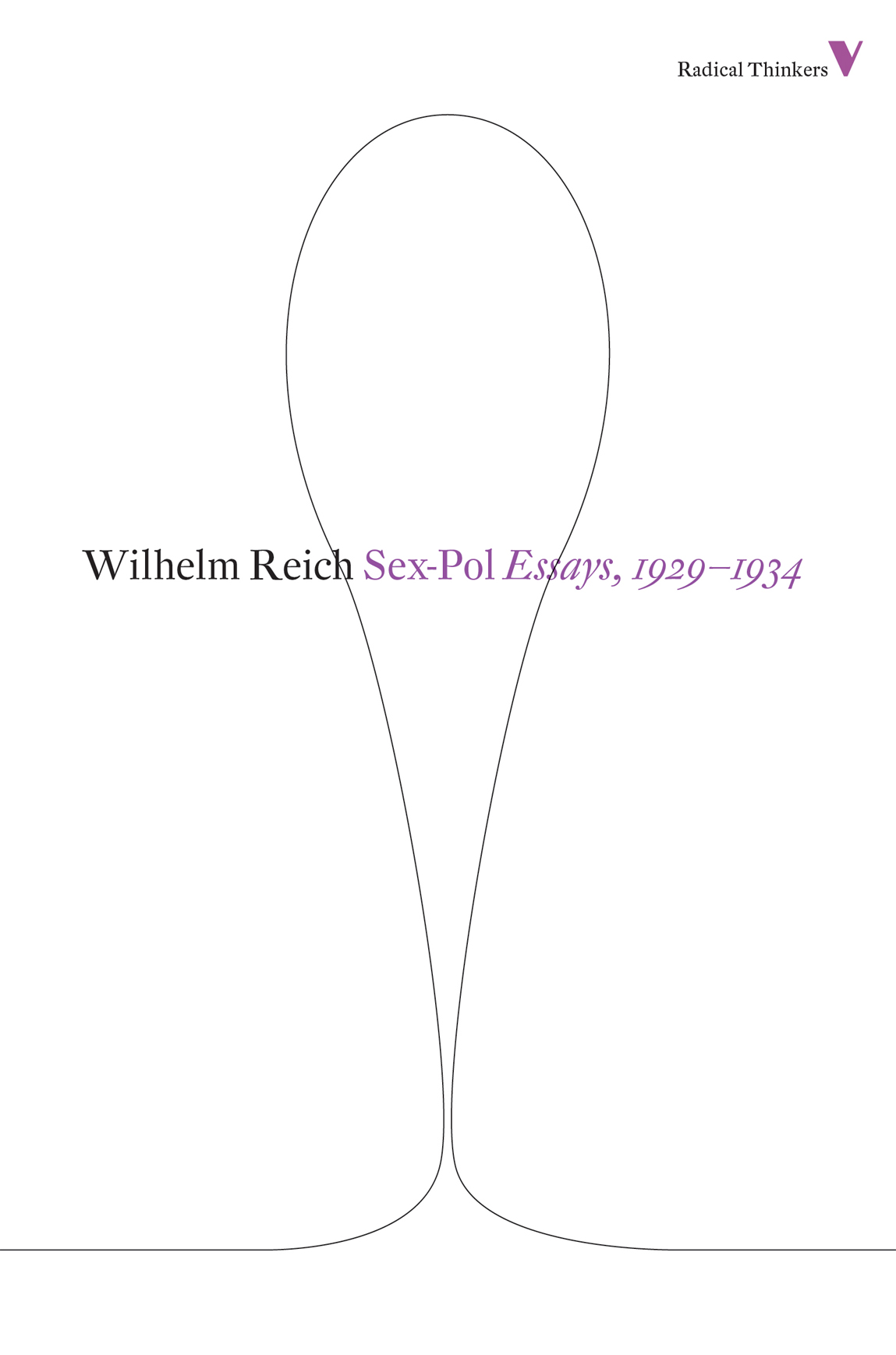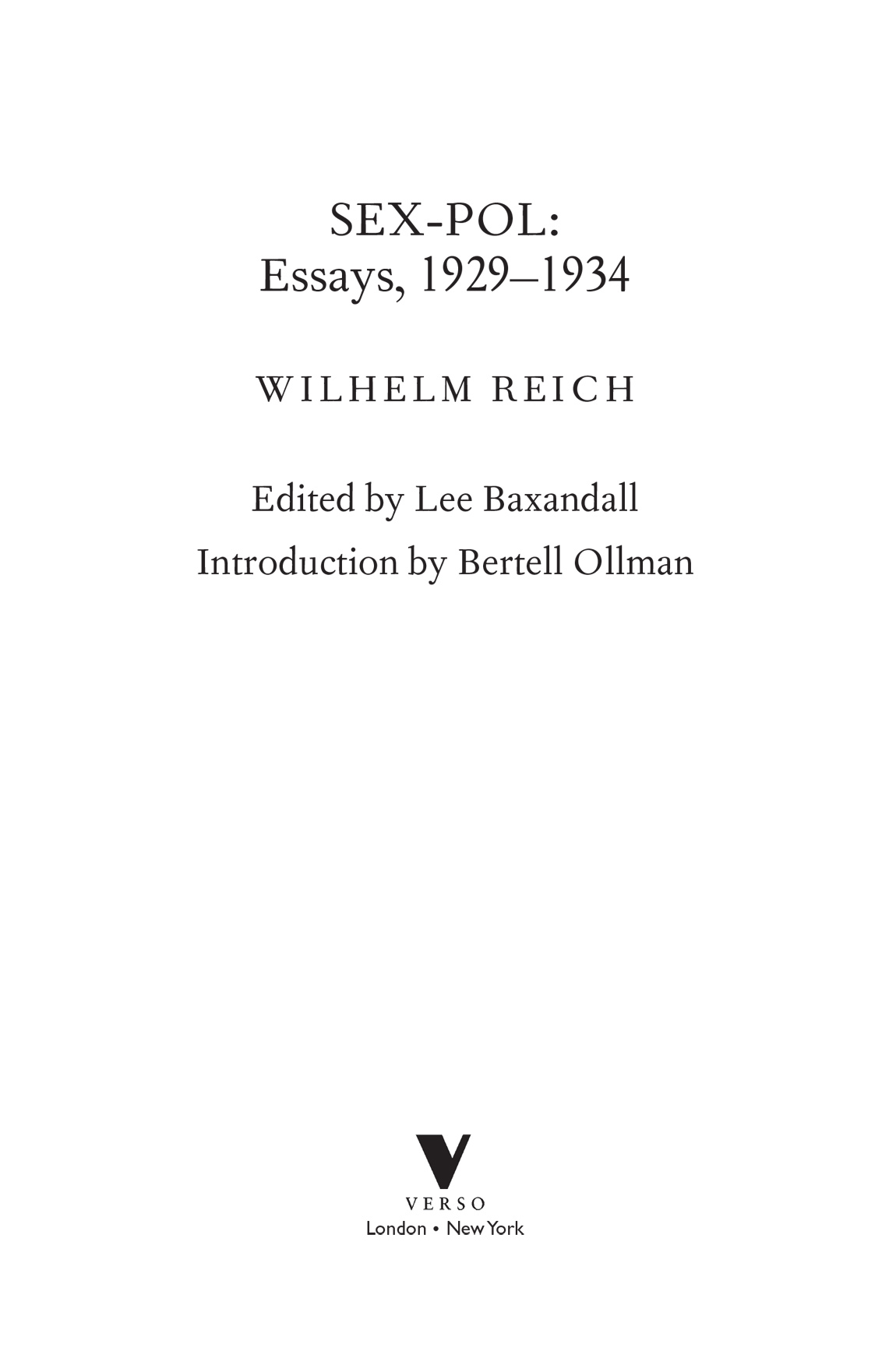Published by Verso 2012
Verso 2012
Published by Vintage 1972
Foreword Lee Baxandall 1972
Introduction Bertell Ollman 1972
All rights reserved
The moral rights of the authors have been asserted
Verso
UK: 6 Meard Street, London W1F 0EG
US: 20 Jay Street, Suite 1010, Brooklyn, NY 11201
www.versobooks.com
Verso is the imprint of New Left Books
eBook ISBN: 978-1-78168-036-0
Trade Paperback ISBN: 978-1-78168-024-7
British Library Cataloguing in Publication Data
A catalogue record for this book is available from the British Library
Library of Congress Cataloging-in-Publication Data
A catalog record for this book is available from the Library of Congress
v3.1
Foreword
Love first really teaches man to believe in the objective world outside himself. [It] not only makes man an object, but the object a man!
Karl Marx, THE HOLY FAMILY
Wilhelm Reich died in 1957 at the age of sixty. He was in the Lewisburg federal penitentiary. He had been jailed as a result of charges brought by the U.S. Food and Drug Administration, which had also impounded or burned Reichs books. He seemed at the time an improbable candidate for the wave of enthusiasm which his works have since caused world-wide.
An ignominious death was but the ultimate humiliation for a man who had only wanted to relieve mankind of some of its miseriesand whose transgression was that he tirelessly and utterly without compromise pursued that goal wherever it might lead.
Reichs truth-seeking and courage led him, while still in medical school, to the still-experimental and then-suspect discipline of psychoanalysis. He became a major pupil of Freud. And almost as early, these same qualities led to an interest in the ideas of Marx and of socialism and communism. For once a pathway forward was indicated he stepped immediately onto it. The logic of Reichs personal decisions was utterly impersonal in this sense. That he might encounter disapproval and even great hardships from any quarter whatever could not deter him from bringing his life wholeheartedly into line with his thought.
The same disregard for opportunism led to Reichs expulsion from the Communist Party in 1933, and from the International Psychoanalytical Association in 1934.
Thus Reich was cut off (and in one sense, he cut himself off) at the peak of his work from his professional and political colleagues of long standing.
That this severance from the psychoanalytical and socialist movements was not to be irrevocable, however, should have been evident even in the mid-1930s from the obvious fact that both movements were in profound crisis and the expulsions of Reich were one (very significant) token of these crises. His principled and polite but unbending critiques of his co-workersespecially of those Creons who represented the administrative wisdom of the two institutionalizations of basically revolutionary conceptions, and of those who bowed to the Creonswere more than they could tolerate.
But during the 1960s in the New Left youth movements the antagonist of Creon, Antigone, was reborn. And with this development the fallen but hardly decomposed figure of Wilhelm Reich has risen again, borne into view by the fresh generation of radical youthwhose own limitations of courage and vision, we should add, remain to be demonstrated.
The careful Creons whose concern is to preserve the status quo of psychoanalysis or of the political left are undoubtedly apprehensive that this troublesome specter is once more abroad.
From the Antigones of the same world, however, a fraternal response awaits. The integration of Reichs work with that of his peers and successors, and into the structures of our own lives and organizations and thought, is a process that can be said to have begun but has no ending in prospect.
The introductory essay which follows is remarkably concise and totalizing and suggestive. It provides, I believe, a notable contribution to the interpretation equally of Reich and of Marx. The discriminations offered by Bertell Ollman should enter the mainstream of our discussions.
As concerns the texts in this volume: they are the first straightforward, unrevised English translations of any of the writings of Wilhelm Reich from his Marxist years.
This statement may come as a surprise and shock. The reader may be familiar with such English-language titles as The Mass Psychology of Fascism and The Sexual Revolution werent these first published in German no later than 1936? Yes, books with these titles were first brought out then. However, the contents of the German texts differ, often greatly, from the same titles in English.
Reich never hid this revising. In the years following his extreme disillusionment with Stalinist Russia and no less with the uncritical backers of Stalinism, Reich stressed that politics seemed to him no longer an effective means by which to heal the suffering human animal. Accordingly, in the English editions of books and articles he now chose to bring before a new audience, Reich largely removed the terminology and analysis of social class; he expunged the political guidelines and horizons.
In consequence, to read even what have seemed the most Marxist of Reichs books in English prior to the present volume is to read texts from the European period which were diluted and altered by a welter of terminological changes and substantial omissions and substitutions.
We needed a collection of unrevised European-period Reich writings in English. In particular, we needed a selection of the sex-political investigations and guideline papers which Reich, once he had grown intransigent toward Stalinistic socialism and labor organizations, no longer felt he had any reason to reissue.
This volume contains the first collection of such texts.
It is to be hoped that English translations of all the original writings of Reich from 192736 may shortly follow.
Lee Baxandall
Contents
Introduction
by Bertell Ollman
womens liberation movement has provided ample evidence to show that in our society this relationship is one of inequality, one in which the woman is used as an object, and one which does not bring much satisfaction to either party. As predicted, these same qualities can be observed throughout capitalist life. Inequality, people treating each other as objects, as instances of a kind (not taking anothers unique, personalizing characteristics into account), and the general frustration that results are major features in the alienation described by Marx.
Yet Marx himself never tried to explain what we may now call sexual alienation. Pointing to the fact of exploitation and indicating that this is typical of what goes on throughout capitalist society is clearly insufficient. We also want to know how the capitalist system operates on the sexual lives and attitudes of people, and conversely, what role such practices and thinking plays in promoting the ends of the system. What is missing from this dialectical equation is the psychological dimension which, given the state of knowledge in his time, Marx was ill equipped to provide.
Half a century after Marxs death, the task of accounting for sexual alienation was taken up by Wilhelm Reich. Born in Austrian Galicia in 1897, Reich came to Vienna after World War I to study medicine, and in 1920, while still a student, became a practicing psychoanalyst. By 1924, he was director of the Viennese Psychoanalytic Societys prestigious seminar in psychoanalytic technique and highly regarded for his contributions in this field. Almost from the start of his career as an analyst, however, Reich was troubled by Freuds neglect of social factors. His work in the free psychoanalytic clinic of Vienna (192230) showed him how often poverty and its concomitantsinadequate housing, lack of time, ignorance, etc.contribute to neuroses. He soon became convinced that the problems treated by psychoanalysis are at their roots social problems demanding a social cure. Further investigation brought him to Marxism and eventually, in 1927, to membership in the Austrian Social Democratic Party.



